 Guest blogged by Ernest A. Canning
Guest blogged by Ernest A. Canning
Republicans in state after state across the country today, Memorial Day 2011, are remembering those who fought and died to protect our democracy by celebrating recent victories in their renewed effort to remove the right to vote for hundreds of thousands, if not millions, of legal American voters.
It's been just days since we filed "GOP Voter Suppression Shifts Into High Gear in State After State as 'Tea Party' Shell Game Exposed" on May 23, detailing new GOP-passed polling place Photo ID restrictions in states like SC and FL, but since then we can report that Gov. Rick Perry (R) signed a bill legalizing polling place photo ID restrictions in TX and Gov. Scott Walker (R) signed a photo ID restriction bill in WI.
Both of them, as opponents have documented over and over again, will serve to do little more than to disenfranchise far more legal (largely Democratic-leaning) voters than those who will be kept from fraudulently impersonating other voters at the polling place, which, as even most proponents admit when forced, happens almost never --- if it all.
Thankfully in at least one instance since our last report, Gov. Mark Dayton (D) of MN vetoed a photo ID measure passed by Republicans in his state. So there is one case, at least, where the memories of our fallen soldiers might be appropriately honored this weekend, as one governor has remembered to protect the very thing that so many of them died for.
Despite the fact that the U.S. Supreme Court upheld the enactment of Indiana's photo ID law in Crawford vs. Marion County Election Bd. (2008), both the new WI photo ID law, which may cost WI taxpayers $7 million to implement, and both the SC and TX photo ID laws, which do not even recognize student photo IDs, may be subject to significant legal challenges...
The Con Con
In a two-page letter issued along with his veto of the Minnesota legislature's Photo ID voter suppression bill, Gov. Dayton noted:
Dayton did not believe the "premise that voter fraud is a significant problem" in his state. In particular, the offense most often cited there --- felons voting illegally --- will not be addressed by a polling place photo identification requirement, as felons often have a driver's license.
Dayton's conclusions are in line with a 2007 academic study by the Brennan Center for Justice, NYU Law School, "The Truth About Voter Fraud", which not only underscores the rarity of voter fraud, specifically polling place voter impersonation, in general, but found "only a handful of known cases in which people rendered ineligible by convictions cast ballots despite knowing that they were not permitted to do so."
The study found a far greater risk that legal voters will be unlawfully disqualified because of clerical errors:
Curiously, Dayton's veto message finds off-hand support from the lead opinion in Crawford, the U.S. Supreme Court decision which upheld IN's photo ID law. The Court acknowledged [emphasis added]: "The record contains no evidence of any such fraud actually occurring in Indiana at any time in its history."
Talk about photo ID being "a solution in search of a problem."
While Indiana's bill instituted the most restrictive Photo ID laws in the nation at the time --- creating extraordinary barriers for legal voters without a driver's license, resulting in untold numbers of voters being disenfranchised beginning in 2008, including elderly nuns, students and even WWII vets --- the restrictions now being rammed through state legislatures elsewhere are arguably even more objectionable.
Texas and Wisconsin are not Indiana
The fact that the U.S. Supreme Court, in Crawford, rejected a legal challenge to the IN photo ID law by a 6-3 decision does not mean that photo ID laws will be upheld elsewhere.
In Crawford, the District Court found that the petitioners had "not introduced evidence of a single, individual Indiana resident who will be unable to vote as a result of [the photo ID statute] or who will have his or her right to vote unduly burdened by its requirements."
The Court's lead opinion was written by Justice John Paul Stevens; joined by Chief Justice John Roberts and Justice Anthony Kennedy. Stevens applied the standards formulated in Harper vs. Virginia Bd. of Elections where, in the absence of evidence of invidious discrimination (a poll tax in that case) which is unrelated to voter qualifications, "a court must identify and evaluate the interests put forward by the State as justifications" for such a statute against "the burden imposed by its rule."
The three Justices, on the basis of the record before it, simply upheld the District Court finding that the IN photo ID statute did not impose an undue burden, while signaling they'd be open to a different ruling if such a burden, on a specific voter, was identified. The three dissenting jurists, while applying the same legal standard, felt that the statute imposed an undue burden. Only three of the nine Justices, Antonin Scalia, Clarence Thomas and Samuel Alito, were of the opinion that the burdens imposed on voters were irrelevant.
But even John Tanner, a man who never saw restriction on legal voters he didn't like while working for the Bush DoJ, sees the laws recently signed in Texas and other southern states differently.
Long time readers of The BRAD BLOG will remember Tanner as the former Chief of the DoJ's Voting Rights Division who we famously video-taped here in Los Angeles asserting that Photo ID restrictions were arguably onerous for the elderly, but not so much for minorities because they don't "become elderly, they die first". That video (see a clip at right) ultimately led to Congressional condemnation, sad hearings and, finally, Tanner's resignation.
When even he questions the Constitutionality of your Photo ID laws, you know you may have a problem, as he opined this week in the Austin American-Statesman (continuing his justifications for approving the restrictions in GA and IN):
A larger number of affected voters and a more onerous burden, Tanner concedes in his attempt to rehabilitate himself, could very well invalidate new photo ID laws elsewhere.
Tanner points to isolated, impoverished TX communities where individuals would have to travel 120 miles round trip to the county seat. He suggests that where photo ID proponents look at Crawford and think they have a slam-dunk, the reverse is likely to be true.
The IN photo ID law did not impose "a substantial burden on most voters," he argues (ignoring that fact a right is violated when it affects just one person) because "Indiana's cards are free," available at the county seat, which is visited on a regular basis in the state by most residents. Obtaining them at "the Bureau of Motor Vehicles," while perhaps inconvenient, did not represent "a significant increase over the usual burdens of voting," he cites Justice Stevens as finding.
WI, a state which requires only ten (10) days residency before voting, differs markedly from IN not only in the number of eligible voters affected by photo ID, but in the burden imposed by the newly enacted law.
Where the District Court in Crawford found that 99% of IN voters already possessed the requisite ID, a recent study by the Univ. of Wisconsin-Madison revealed that more than 177,000 WI residents over the age of 65 did not possess a driver's license; that 70% of that number are women.
The study revealed that low income individuals, especially people of color, will be adversely affected:
Only 2% of college students living in residence halls in UWM, Marquette Univ. and Univ. of Wisconsin-Madison possessed driver's licenses listing their dorms as their residence, according to the study. The would all be disenfranchised if the law is upheld and carried out as written.
IN has full time DMVs in every county, with some 124 offices open on weekends. Three WI counties have no DMV at all. More than one-half of Wisconsin's 91 DMVs are open only on a part-time basis; 26% for only one day per month, or less. Only one WI DMV is open on weekends at all.
What proponents of IN's law may argue was just minor inconvenience there, given the number of DMVs and availability of free IDs in the state, amounts to a huge, if not insurmountable obstacle for large numbers of voters in both TX and WI. This is especially true in WI because, on a strictly partisan vote, the WI GOP approved an amendment to its undemocratic photo ID bill so as to render it effective, in large measure, during the pending Recall elections just over a month way.
The WI Government Accountability Office (G.A.B.) has already tentatively scheduled the recall elections of three GOP state Senators for July 12, 2011, with another three GOP and three Democratic Senators facing potential recall votes shortly as well.
Given the irreparable harm that the combination of the swift adoption of the photo ID law, the large numbers of legitimate voters adversely affected and the inadequate ability to meet photo ID requirements in such a short time, the WI Democratic Party and/or other interested parties would seem to be well-positioned to file an immediate circuit court action seeking to enjoin enforcement of the new WI photo ID law.
Violating the Voting Rights Act
In 1970, the Voting Rights Act of 1965 was amended to include a finding that "the imposition and application of the durational residency requirement as a precondition to voting for the offices of President and Vice President...denies or abridges the inherent constitutional right of citizens to vote." That specific provision withstood a constitutional challenge in Oregon v. Mitchell (1970), a U.S. Supreme Court case which held upheld the provision as necessary and proper "to protect the privileges of United States citizenship, including the freedom to travel and to change one's residence."
While the Court did not reach the same conclusion with respect to extending the right to vote to those who were 18 years or older, that right was later established by the 26th Amendment. The important feature of a photo ID law which excludes student IDs, is the potential burden it places on students who are domiciled in another state for a two to four year period solely to complete their education.
Given that TX, due to its past association with the Jim Crow South, is subject, under the VRA, to pre-clearance of election laws, this aspect, as well as issues of disproportionate impact on minority and working class voters and the burden of distance acknowledged even by John Tanner, should receive careful scrutiny by the U.S. Department of Justice.
Ultimately, proponents of such laws who have been misinformed about them via well-funded GOP astroturf campaigns, would do well to strive to understand the difference between rights established in our Constitution and privileges such as purchasing beer or flying on planes or receiving a passport. Each of those privileges are frequently cited by proponents of polling place Photo ID restrictions to demonstrate how such things require a Photo ID, so why shouldn't voting?
In truth, none of those things require a Photo ID, though it wouldn't matter even if they did. Voting remains a right, not a privilege, and should not be barred by big government restrictions removing such rights by fiat.
And, of course, their is the point that polling place voter impersonation remains "as rare as hen's teeth," as even Tanner admits after years of working for George W. Bush's Dept. of Justice which committed unprecedented resources and funding into seeking out and prosecuting acts of "voter fraud" but were ultimately able to unearth "scant evidence" of it across the entire country.
Meanwhile, back in SC, where Gov. Nikki Haley recently signed the state's new law replacing their previous, sensible voter ID requirement to show a voter registration card before voting, with a mandate to show state-issued Photo ID at the polling place, even the state Election Commission said they had no reports of voter fraud any time in recent history.
Happy Memorial Day, GOP.
UPDATE: Although the WI GAB tentatively set the date for the recalls of three state GOP Senators, it has pushed back the date for the recall elections of Sen. Alberta Darling (R) and the recall elections of three state Democratic Senators as it reviews their respective challenges. In the case of the three Democrats, the review pertains to "claims of irregularities involving the firm that was hired to do the petition drive."
Ernest A. Canning has been an active member of the California state bar since 1977. Mr. Canning has received both undergraduate and graduate degrees in political science as well as a juris doctor. He is also a Vietnam vet (4th Infantry, Central Highlands 1968).


 Sunday 'Close Enough' Toons
Sunday 'Close Enough' Toons A Pretty Weak 'Strongman': 'BradCast' 10/30/25
A Pretty Weak 'Strongman': 'BradCast' 10/30/25 'Green News Report' 10/30/25
'Green News Report' 10/30/25
 Proposal for 'First Politically Viable Wealth Tax' Takes Shape in CA: 'BradCast' 10/29/25
Proposal for 'First Politically Viable Wealth Tax' Takes Shape in CA: 'BradCast' 10/29/25 Monster Storm, Endless Wars, Gamed Elections:
Monster Storm, Endless Wars, Gamed Elections: 'Green News Report' 10/28/25
'Green News Report' 10/28/25 Let's Play 'Who Wants
Let's Play 'Who Wants Sunday 'Cartoonists Dilemma' Toons
Sunday 'Cartoonists Dilemma' Toons Exiled NOAA Scientists Resurrect Critical Disaster Database: 'BradCast' 10/23/25
Exiled NOAA Scientists Resurrect Critical Disaster Database: 'BradCast' 10/23/25  'Green News Report' 10/23/25
'Green News Report' 10/23/25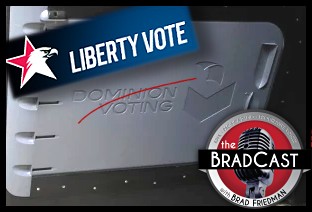 Trump-Allied GOP Partisan Buys Dominion Voting Systems: 'BradCast' 10/22/25
Trump-Allied GOP Partisan Buys Dominion Voting Systems: 'BradCast' 10/22/25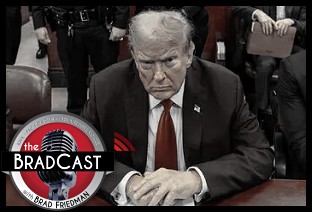 Trump, Republican Law(lessness) & (Dis)Order: 'BradCast' 10/21/25
Trump, Republican Law(lessness) & (Dis)Order: 'BradCast' 10/21/25 'Green News Report' 10/21/25
'Green News Report' 10/21/25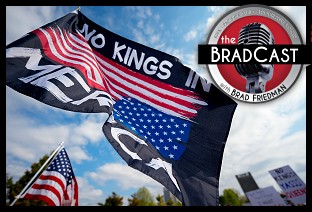 Celebrating 'No Kings': 'BradCast' 10/20/25
Celebrating 'No Kings': 'BradCast' 10/20/25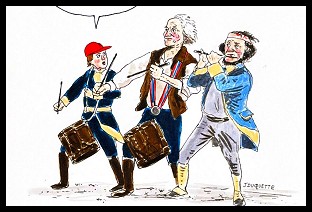 Sunday 'How It Started' Toons
Sunday 'How It Started' Toons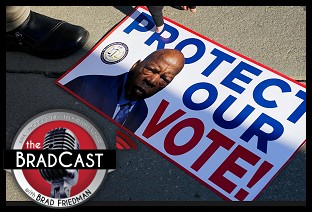 SCOTUS Repubs Appear Ready to Gut Rest of Voting Rights Act: 'BradCast' 10/16/25
SCOTUS Repubs Appear Ready to Gut Rest of Voting Rights Act: 'BradCast' 10/16/25 'Green News Report' 10/16/25
'Green News Report' 10/16/25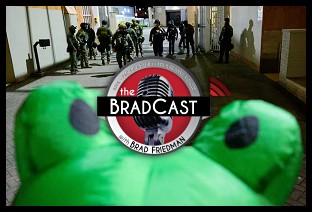 The 'Epstein Shutdown' and Other Autocratic Nightmares: 'BradCast' 10/15/25
The 'Epstein Shutdown' and Other Autocratic Nightmares: 'BradCast' 10/15/25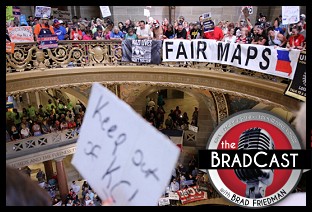 Group Vows to Block MO's GOP U.S. House Gerrymander: 'BradCast' 10/14/25
Group Vows to Block MO's GOP U.S. House Gerrymander: 'BradCast' 10/14/25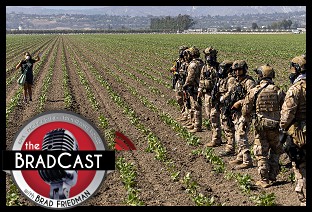 Trump Labor Dept. Warns Trump Policies Sparking Food Crisis: 'BradCast' 10/9/25
Trump Labor Dept. Warns Trump Policies Sparking Food Crisis: 'BradCast' 10/9/25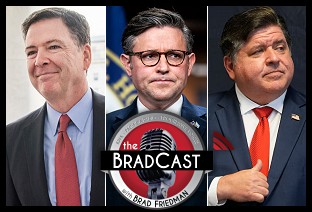 Trump's Losing Battles: 'BradCast' 10/8/25
Trump's Losing Battles: 'BradCast' 10/8/25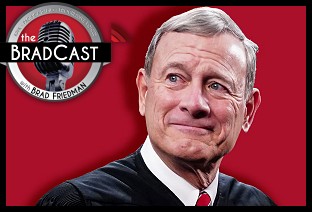 Trump, Roberts and His Stacked, Packed and Captured SCOTUS: 'BradCast' 10/7/25
Trump, Roberts and His Stacked, Packed and Captured SCOTUS: 'BradCast' 10/7/25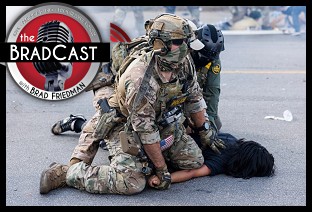 Trump Attempting His 'Invasion from Within': 'BradCast' 10/6/25
Trump Attempting His 'Invasion from Within': 'BradCast' 10/6/25 Biden Budget Expert: Mass Firings in Shutdown 'Illegal': 'BradCast' 10/2/25
Biden Budget Expert: Mass Firings in Shutdown 'Illegal': 'BradCast' 10/2/25 Why is DOJ Suing 'Blue' States for Their Voter Databases?: 'BradCast' 10/1/25
Why is DOJ Suing 'Blue' States for Their Voter Databases?: 'BradCast' 10/1/25
 VA GOP VOTER REG FRAUDSTER OFF HOOK
VA GOP VOTER REG FRAUDSTER OFF HOOK Criminal GOP Voter Registration Fraud Probe Expanding in VA
Criminal GOP Voter Registration Fraud Probe Expanding in VA DOJ PROBE SOUGHT AFTER VA ARREST
DOJ PROBE SOUGHT AFTER VA ARREST Arrest in VA: GOP Voter Reg Scandal Widens
Arrest in VA: GOP Voter Reg Scandal Widens ALL TOGETHER: ROVE, SPROUL, KOCHS, RNC
ALL TOGETHER: ROVE, SPROUL, KOCHS, RNC LATimes: RNC's 'Fired' Sproul Working for Repubs in 'as Many as 30 States'
LATimes: RNC's 'Fired' Sproul Working for Repubs in 'as Many as 30 States' 'Fired' Sproul Group 'Cloned', Still Working for Republicans in At Least 10 States
'Fired' Sproul Group 'Cloned', Still Working for Republicans in At Least 10 States FINALLY: FOX ON GOP REG FRAUD SCANDAL
FINALLY: FOX ON GOP REG FRAUD SCANDAL COLORADO FOLLOWS FLORIDA WITH GOP CRIMINAL INVESTIGATION
COLORADO FOLLOWS FLORIDA WITH GOP CRIMINAL INVESTIGATION CRIMINAL PROBE LAUNCHED INTO GOP VOTER REGISTRATION FRAUD SCANDAL IN FL
CRIMINAL PROBE LAUNCHED INTO GOP VOTER REGISTRATION FRAUD SCANDAL IN FL Brad Breaks PA Photo ID & GOP Registration Fraud Scandal News on Hartmann TV
Brad Breaks PA Photo ID & GOP Registration Fraud Scandal News on Hartmann TV  CAUGHT ON TAPE: COORDINATED NATIONWIDE GOP VOTER REG SCAM
CAUGHT ON TAPE: COORDINATED NATIONWIDE GOP VOTER REG SCAM CRIMINAL ELECTION FRAUD COMPLAINT FILED AGAINST GOP 'FRAUD' FIRM
CRIMINAL ELECTION FRAUD COMPLAINT FILED AGAINST GOP 'FRAUD' FIRM RICK SCOTT GETS ROLLED IN GOP REGISTRATION FRAUD SCANDAL
RICK SCOTT GETS ROLLED IN GOP REGISTRATION FRAUD SCANDAL VIDEO: Brad Breaks GOP Reg Fraud Scandal on Hartmann TV
VIDEO: Brad Breaks GOP Reg Fraud Scandal on Hartmann TV RNC FIRES NATIONAL VOTER REGISTRATION FIRM FOR FRAUD
RNC FIRES NATIONAL VOTER REGISTRATION FIRM FOR FRAUD EXCLUSIVE: Intvw w/ FL Official Who First Discovered GOP Reg Fraud
EXCLUSIVE: Intvw w/ FL Official Who First Discovered GOP Reg Fraud GOP REGISTRATION FRAUD FOUND IN FL
GOP REGISTRATION FRAUD FOUND IN FL

































